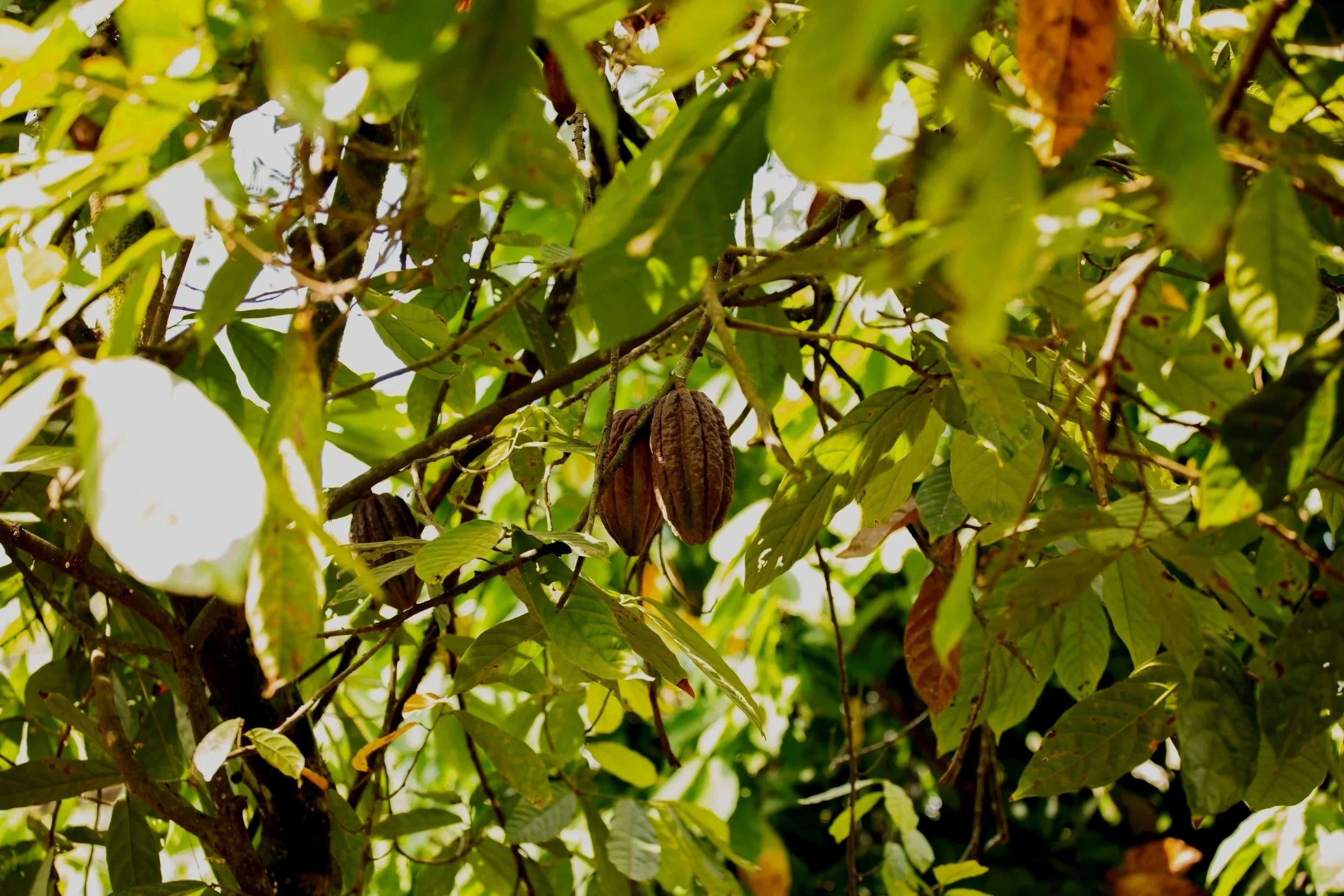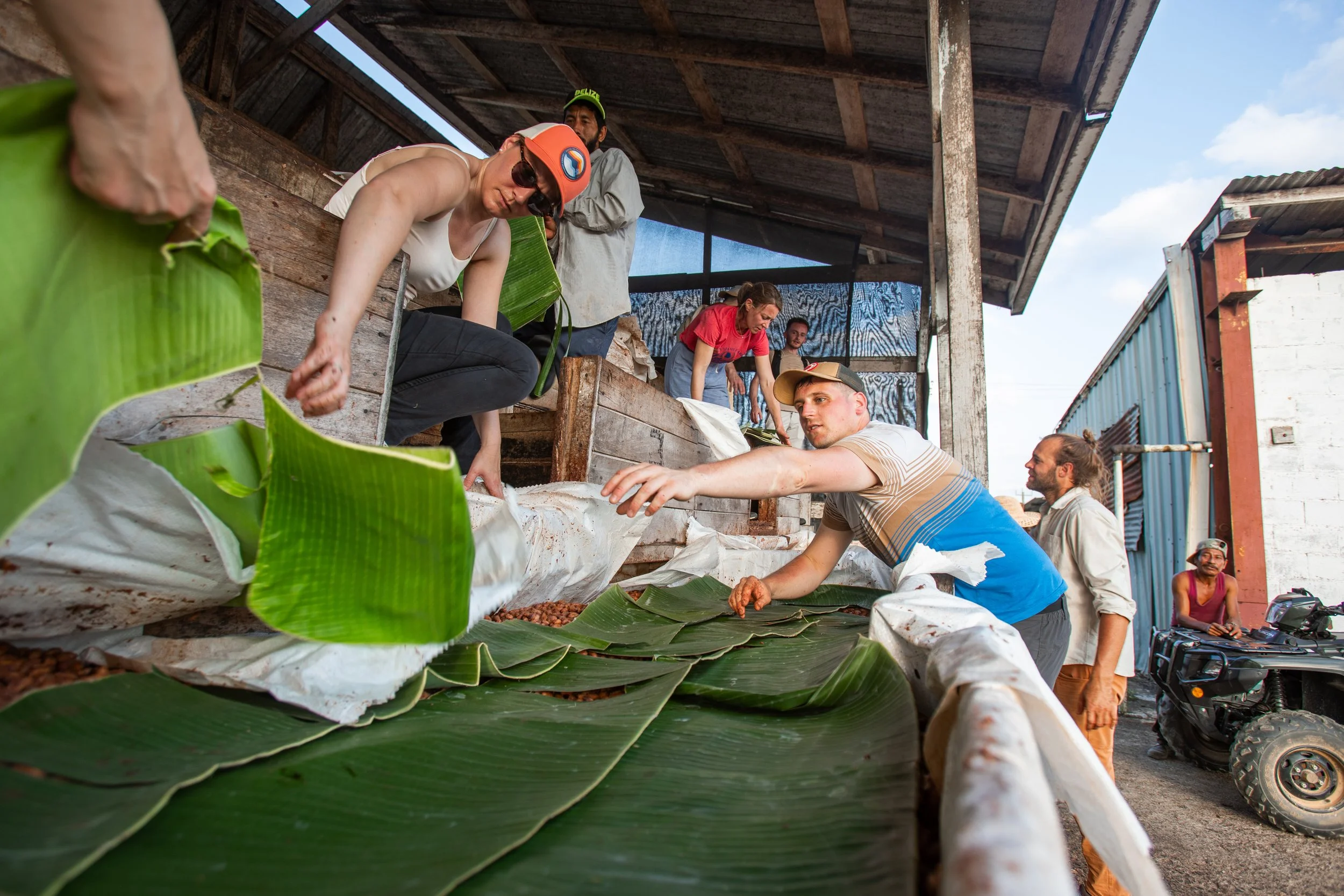
Collaborating Toward a More Sustainable Chocolate Future:
A Q&A with Stéphane Sabourin and Mandy Cabot
Chocolate is more than a delicious treat — it’s a colorful story of land, farmers, and craft. When Silk Grass Farms partnered with Valrhona, one of France's premier chocolate-makers, the result was not just exceptional chocolate but a model for how values-driven companies can reshape an industry.
Valrhona, founded in 1922 by pastry chef Albéric Guironnet, is globally recognized as a pioneer in the chocolate industry. The company is committed to promoting fairness and sustainability within the cocoa sector by fostering close, mutually beneficial relationships with cocoa supplier partners. Through these long-term partnerships, Valrhona sources the highest-quality cacao beans from around the world and uses them to create premium chocolate, which it distributes to world-class chefs.
A few years ago, Valrhona Sourcer and Cocoa Development Manager Stéphane Sabourin connected with Silk Grass Farms and discovered our deeply shared values and outstanding cacao. Both Certified B Corporations, Valrhona and Silk Grass Farms share a commitment to using business as a force for good.
Today, Valrhona buys the entire cacao harvest from Silk Grass Farms' Xibun River Estates for its Tulakalum chocolate, as well as its Xibun chocolate co-developed with the famous pastry chef Pierre Hermé. Recently, Stéphane led a team of Valrhona representatives on a visit to our farms in Belize along with more than 20 Valrhona customers, including chefs and pastry chefs from France and Germany. On the trip, the group visited our cacao fields, joined our staff in processing and fermenting cacao beans, and hosted a pastry-making workshop where our employees experienced Tulakalum chocolate pastry-making firsthand. Watch highlights of Valrhona's recent visit to Silk Grass Farms.
In this Q&A, Stéphane joins our co-founder and CEO Mandy Cabot to discuss the partnership, the companies’ shared values, and why the recent visit was meaningful.
Why is Valrhona so deeply invested in building relationships with its suppliers?
Stéphane: To make the best chocolate, Valrhona needs the best cacao. More than 30 years ago, Valrhona started to work directly with cocoa farmers in Venezuela and Brazil to ensure the quality of our cocoa and chocolate. With our own Valrhona agronomists and sources working closely with cocoa estates in these countries, we witnessed the reality of cocoa-producing communities, and got to experience their social and environmental challenges first-hand.
Our responsibility at Valrhona is to supply our customers — the chef community — with responsible chocolate and to raise awareness of the challenges of the cocoa industry. For so long, the industry has been extractive. There are many changes to be made, and every actor in the value chain has a role to play. At the heart of sustainability and responsibility, there is value. Valrhona is aiming to bring value back to the foundation — farmers and their farms — through regenerative practices across the industry.
Why is this important to Valrhona as a company?
Stéphane: First, because responsibility means fairness and sustainability. If the people at the beginning of the value chain, those taking care of the cocoa trees and the cocoa beans, are not treated fairly, we can't expect them to create the highest quality cocoa while preserving a healthy environment and communities.
It’s also about accountability. Let’s say the cocoa you receive is not of the quality you are expecting. If you don't know who produced it, you won’t be able to provide feedback and correct the issue.
Finally, in light of global changes, we need to work to secure our cocoa supply into the future. Valrhona is more than 100 years old, and we aim to be here in another 100 years. If there are no farmers to produce high-quality cocoa in 5, 10, or 15 years, we won't be able to continue to supply pastry chefs with the best chocolate.
When did you know that this partnership was a good fit, Mandy?
Mandy: Peter (Silk Grass Farms co-founder Peter Kjellerup) and I visited Valrhona’s headquarters in Tain-L’Hermitage, France, in 2022. There we learned the proper techniques for experiencing what is arguably the world’s finest chocolate. Before a single piece of chocolate ever passed our lips, we were taught to see, touch, smell, and listen to the snap of the iconic Valrhona medallions. We were instructed not to bite, but to let the chocolate melt slowly on our tongues, allowing the flavors to develop and coat our palates.
Tasting the chocolate’s superior quality and seeing the level of care that Valrhona put into the act of eating it, I could tell the depth of dedication and passion that went into every aspect of making it. That kind of quality is only created with happy people who are passionate about their work and committed to the pursuit of excellence. Learning about our many shared values and B Corp status just solidified the synergy between our organizations.
Stéphane, can you share your perspective about how Valrhona and Silk Grass Farms are aligned around values?
Stéphane: Silk Grass Farms and Valrhona are two actors in the same value chain, looking in the same direction with the same ambitions: sustainability, responsibility, and regeneration. We both know we are starting from an extractive industrial model that we need to change. We need each other both as part of the value chain and to strengthen our commitments and attract more people to the work to change the ecosystem. Together, we are stronger.
We are no longer considering just cocoa or cocoa trees. We are considering the cocoa trees as part of a larger ecosystem — how they coexist with water, other plants, animals, everything, including humans and communities. That’s the systemic approach we’re sharing with Silk Grass Farms.
Both Silk Grass Farms and Valrhona are certified B Corporations. Part of the B Corp ethos is interdependence. How does interdependence play into this partnership and the work toward a more sustainable chocolate industry?
Mandy: “Tulakalum,” the name given by Valrhona for our single-origin chocolate, means "together" in Mayan. For me, it means partnership. Valrhona is the kind of partner that companies like ours dream of. Their sustainability pillars of Zero Deforestation, Agro-Ecology, Traceability, and Worker Rights intersect perfectly with Silk Grass Farms, and we are both fervently committed to the rigorous third-party validation that’s provided by the global non-profit B Lab. Together, we can bring the unique flavors of Belizean chocolate to the world. Together, we can demonstrate how our respective businesses add value to the communities that we’re a part of — environmentally, socially, economically, and culturally. Together, we can maximize our collective impact.
Stéphane: Developing a truly regenerative approach requires changes Valrhona can’t make alone. The only way to regenerate the environment is on the ground, in the field. We are here in France making chocolates, working on reducing our waste and our local impact on water and greenhouse gas emissions. We are not putting trees into the ground. Negative impacts must be fixed where they occur, and we can’t work on the impacts of cocoa supply from France. That means if we want to give back to the environment, we must work with our core partners who are on the ground. We have to play with the other actors in the value chain, and Silk Grass Farms is a strong part of that solution.
With the increasing ability to collaborate digitally worldwide, why visit the farm in person? Why not just do a video call?
Stéphane: When I go to Silk Grass Farms, the point is not just to visit but to maintain the relationship, to talk about the specific challenges you’re facing and how Valrhona can provide support. We are sharing in a partnership. Sometimes it's about purchasing cocoa, sometimes quality, sometimes the responsibility side, the impact on the environment, all of these aspects. Yes, today it's easier than ever to talk across continents, but it’s still worth it to be on the ground, to talk directly with people and experience their realities. We are working with suppliers in 19 countries this year. Every single country is different—the culture, language, economy, weather. Our core objective is to have the knowledge to approach the specific realities of each of our partners so we can adapt our support with the same goal of a fair and sustainable cocoa industry. That is a win-win objective.
Mandy: For me personally, the open-ended conversations we can have in person about how our partnership might evolve — leveraging Silk Grass Farms’ location, experience, and single-origin cocoa with Valrhona’s chocolate-making magic and undisputed reputation — provide the springboard for many more conversations to come.
Why was it valuable for the pastry chefs to visit Silk Grass Farms?
Stéphane: We work with a big community of pastry chefs. Few of them have the opportunity to visit a cocoa plantation. Not many people in Europe and the U.S. know where chocolate comes from. When we bring chefs to Belize, our goal is to raise awareness about where we source cocoa — the main ingredient of our chocolate — and show them who is producing it from the ground up. This experience helps them appreciate the true value of chocolate, and all the manual work required to get the high quality cocoa ingredient they use every day.
Mandy: For Valrhona’s guests, seeing the “people behind the cacao pods” and better understanding the care it takes to grow, harvest, ferment, sun-dry, and sort cacao was an invaluable experience and deepened their appreciation of this versatile fruit. Likewise, watching France’s top pastry chefs transform Tulakalum chocolate into gastronomic works of art was an unforgettable experience for the Silk Grass staff.
How did you both enjoy the pastry workshop that Valrhona orchestrated?
Mandy: The workshop was an experience I’ll never forget. Fifteen world-class pastry chefs were paired with 15 (willing, but totally inexperienced) Silk Grass Farms team members to create randomly assigned desserts featuring Tulakalum chocolate and locally sourced ingredients. We communicated in gestures and broken English; we laughed and we hustled; we spilled a little and tasted a lot; and when the final bell rang, we presented the most beautiful chocolate creations I could have ever imagined…or tasted.
Stéphane: The pastry workshop was a way for us to give back to the Silk Grass Farms staff by letting them experience and participate in what the cocoa beans they grow turn into. It was a real shared experience. I think everybody had a fun time, and we made some great pastry. It was bringing the pastry experience to the Silk Grass Farm team, showing the end product of the value chain that begins with them at the farm. It was a great way for our cocoa producers and pastry chef communities to come together and share a wonderful moment to experience.







